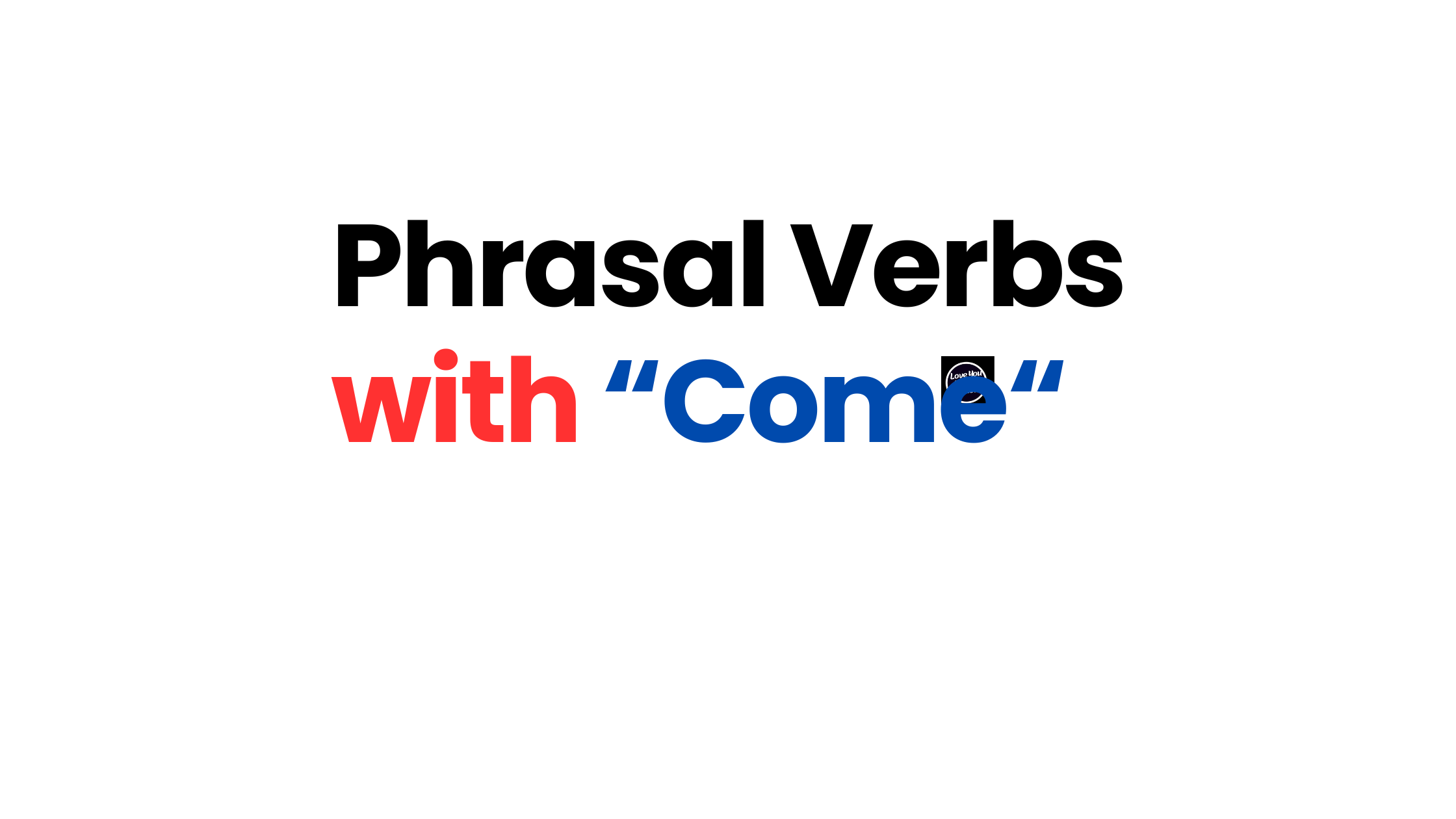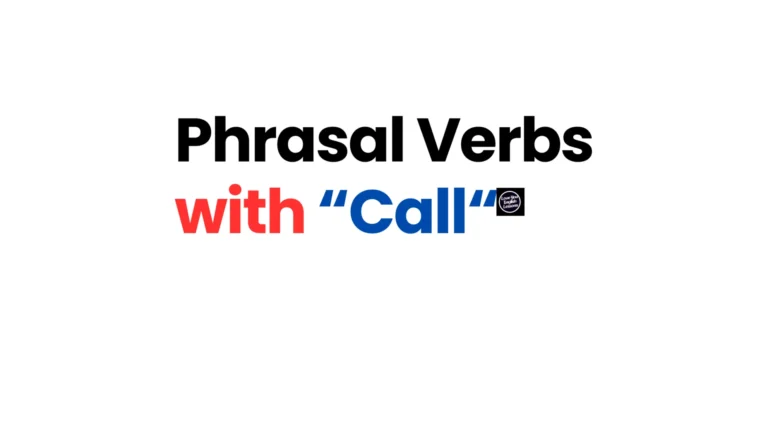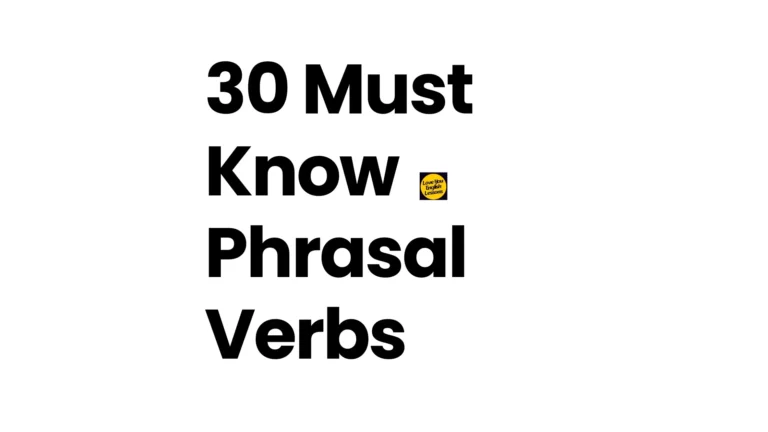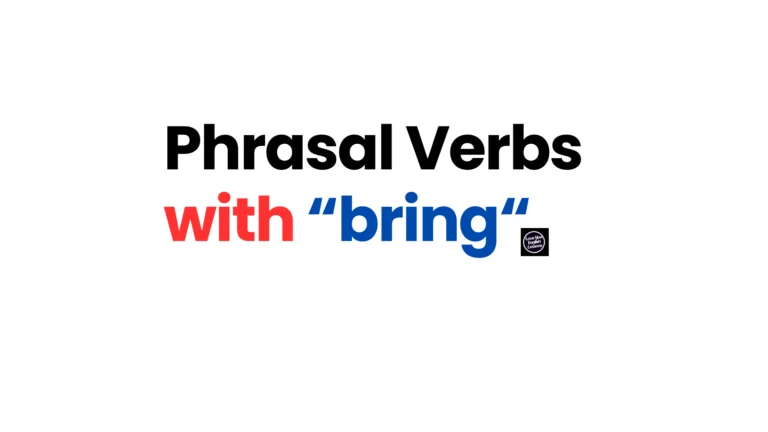Phrasal Verbs with “COME,” along with their meanings
What are phrasal verbs and how to use them?
Phrasal verbs are like the cool kids of the English language – they’re a combo of a verb and one or more prepositions or adverbs.
Think of them as those dynamic duos that spice up your conversations.
Using phrasal verbs can make your language more vivid and informal.
Instead of saying “look for,” you can jazz it up with “search for.”
Or, swap out “give up” for the more laid-back “quit.”
Here’s the thing: sometimes the meaning of a phrasal verb isn’t obvious by just looking at the individual words.
You kind of need to get the vibe of it through usage.
Like, take “hang out.” It doesn’t mean hanging clothes; it means chilling with friends.
So, to really get the hang of phrasal verbs, you got to pay attention to how people use them in context.
Also, don’t be afraid to experiment with phrasal verbs in your own speech.
Just go with the flow, and soon you’ll be tossing them around like a language ninja.
So, kick back, have fun, and let those phrasal verbs add some flair to your English game!
Now, I’ve got tons of phrasal verbs with “COME”.
Let’s dive into it.
Try using them into your daily conversation.
Also read:
Phrasal verbs with “come”
Come across
Meaning: To find or discover unexpectedly.
Example: I came across an old photo album while cleaning the attic.
Come along
Meaning: To accompany or make progress.
Example: Are you coming along to the party tonight?
Come forward
Meaning: To volunteer or offer help or information.
Example: Witnesses are encouraged to come forward with any information.
Come in
Meaning: To enter a place.
Example: Please come in and have a seat.
Come off
Meaning: To succeed or be effective.
Example: The party last night really came off well; everyone enjoyed themselves.
Come out
Meaning: To be revealed or become public.
Example: The truth about the scandal will eventually come out.
Come over
Meaning: To visit someone’s house or location.
Example: Why don’t you come over for dinner tomorrow?
Come to
Meaning: To regain consciousness.
Example: After the accident, it took him a while to come to.
Come on
Meaning: To encourage or hurry someone.
Example: Come on, we’re going to be late for the movie!
Phrasal verbs with “come”
Come around to
Meaning: To eventually accept or agree with something.
Example: It took some time, but she came around to the idea of studying abroad.
Come up
Meaning: To arise or occur.
Example: Unexpected expenses came up, and I had to adjust my budget.
Come down
Meaning: To decrease in price, value, or intensity.
Example: The price of the stock came down after the company’s announcement.
Come out of
Meaning: To exit from a place.
Example: It’s not safe; let’s come out of this dark alley.
Come around
Meaning: To visit someone’s house or location.
Example: Why don’t you come around for tea sometime?
Come on
Meaning: To start functioning or operating.
Example: The lights should come on automatically when it gets dark.
Come through
Meaning: To fulfill a promise or complete a task successfully.
Example: I knew you wouldn’t let me down; you always come through for me.
Come up against
Meaning: To encounter difficulties or challenges.
Example: We came up against some unexpected problems during the project.
Come apart
Meaning: To break into pieces or disintegrate.
Example: The old book was so fragile that it started to come apart in my hands.
Phrasal verbs with “come”
Come to terms with
Meaning: To accept and deal with a difficult or unpleasant situation.
Example: It took him a while to come to terms with the loss of his job.
Come off as
Meaning: To be perceived or appear in a certain way.
Example: Sometimes, his confidence can come off as arrogance.
Come to mind
Meaning: To be remembered or thought of.
Example: When I think of summer, picnics in the park come to mind.
Come clean
Meaning: To confess or admit the truth about something.
Example: It’s time to come clean and tell them what really happened.
Come on
Meaning: To encourage someone to do something faster or with more effort.
Example: Come on, you can finish the project before the deadline!
Come up against
Meaning: To face an obstacle or challenge.
Example: We came up against some unexpected problems during the research.
Phrasal verbs with “come”
Come forward with
Meaning: To offer or provide information or help.
Example: The witness came forward with crucial evidence for the investigation.
Come between
Meaning: To cause a disagreement or separation between people.
Example: Don’t let a small misunderstanding come between you and your friends.
Come off
Meaning: To detach or be removed from something.
Example: The handle of the suitcase came off during the trip.
Come out in
Meaning: To be covered or affected by a rash or skin condition.
Example: After eating the berries, she came out in a red rash.
Read more:
Come down to
Meaning: To ultimately be a matter of or depend on something.
Example: The success of the project will come down to effective teamwork.
Come along with
Meaning: To accompany someone.
Example: Can I come along with you to the bookstore?
Come to a head
Meaning: To reach a critical point or culmination.
Example: The tensions between the two countries finally came to a head, leading to diplomatic action.
Come along with
Meaning: To bring someone or something with you.
Example: Can you come along with me to the store?
Come back
Meaning: To return to a place or activity.
Example: I’ll come back later; I have to attend a meeting now.
Come out in the wash
Meaning: To be resolved or become clear over time.
Example: Let’s see how things go; it will all come out in the wash eventually.
Come up to
Meaning: To approach or reach a particular standard.
Example: Your performance needs to come up to the company’s expectations.
Phrasal verbs with “come”
Come across as
Meaning: To be perceived or appear in a certain way.
Example: He always comes across as very confident during presentations.
Come to a decision
Meaning: To reach a conclusion or make a decision.
Example: After much discussion, we finally came to a decision on the matter.
Come off it
Meaning: To express disbelief or skepticism about what someone has said.
Example: Come off it! You can’t expect me to believe that story.
Come into force
Meaning: To become legally valid or effective.
Example: The new law will come into force next month.
Come round to
Meaning: To change one’s opinion or attitude over time.
Example: She didn’t like the idea at first, but eventually, she came round to it.
Come to a standstill
Meaning: To stop completely, usually referring to movement or activity.
Example: Traffic came to a standstill due to the accident on the highway.
Come out on top
Meaning: To emerge as the winner or successful party in a situation.
Example: Despite the challenges, our team came out on top in the competition.
Come under fire
Meaning: To face criticism or scrutiny.
Example: The government’s new policy has come under fire from various groups.
Phrasal verbs with “come”
Come out ahead
Meaning: To achieve a favorable outcome or gain an advantage.
Example: Despite the challenges, he managed to come out ahead in the business deal.
Come about
Meaning: To happen or occur, especially as a result of certain actions.
Example: The change in leadership came about after a series of discussions.
Come up to
Meaning: To approach or reach a specified level or standard.
Example: Your performance needs to come up to the expectations of the team.
Come in for
Meaning: To receive or be subjected to something, usually criticism or scrutiny.
Example: The new policy came in for heavy criticism from the public.
Come to life
Meaning: To become lively or active.
Example: The garden comes to life in spring with vibrant colors and blossoms.
Come off as
Meaning: To be perceived or appear in a particular way.
Example: She tends to come off as reserved, but she’s actually quite friendly.
Come through with
Meaning: To fulfill a promise or deliver on something.
Example: Despite the challenges, he came through with the completed project on time.
Come in handy
Meaning: To be useful or convenient.
Example: Having a Swiss army knife can really come in handy in various situations.
Come up against
Meaning: To encounter a difficulty or obstacle.
Example: We came up against unexpected challenges during the construction project.
Come around to
Meaning: To eventually agree with or accept something.
Example: After some discussion, he came around to supporting the new proposal.
Phrasal verbs with “come”
Come across as
Meaning: To be perceived or seen in a particular way.
Example: In interviews, it’s important to come across as confident and capable.
Come to terms with
Meaning: To accept and deal with a difficult situation.
Example: It took her a long time to come to terms with the loss of her pet.
Come up
Meaning: To be mentioned or discussed.
Example: The topic of climate change came up during the meeting.
Come down on
Meaning: To criticize or reprimand someone.
Example: The boss came down on the team for not meeting the project deadline.
Come by
Meaning: To visit or drop by a place.
Example: Feel free to come by my office if you have any questions.
Come out on the short end
Meaning: To end up with a less favorable outcome.
Example: Despite their efforts, they came out on the short end of the negotiation.
Come off
Meaning: To be successful or to achieve the desired effect.
Example: The comedian’s jokes really came off well with the audience.
Come through
Meaning: To fulfill a commitment or promise.
Example: I knew you would come through for me when I needed help.
Come to grips with
Meaning: To face and deal with a challenging or difficult situation.
Example: It took her some time to come to grips with the loss of her job.
Come across
Meaning: To make an impression or be perceived in a certain way.
Example: The candidate came across as confident and knowledgeable during the interview.
Come to fruition
Meaning: To successfully develop or materialize.
Example: After years of hard work, the project finally came to fruition.
Come across as
Meaning: To give a particular impression or be perceived in a certain way.
Example: He often comes across as a very approachable and friendly person.
Phrasal verbs with “come”
Come back to haunt
Meaning: To have negative consequences in the future.
Example: Ignoring environmental issues now could come back to haunt us later.
Come up to
Meaning: To meet a certain standard or expectation.
Example: I hope my performance comes up to the company’s standards.
Come over
Meaning: To visit someone’s home or location.
Example: Why don’t you come over for coffee sometime?
Come through for
Meaning: To provide support or assistance in a time of need.
Example: I knew I could count on my friends to come through for me during tough times.
Come down
Meaning: To reduce in quantity, intensity, or price.
Example: The fever finally came down after taking medication.
Come up with
Meaning: To devise or think of a plan, idea, or solution.
Example: Can you come up with a creative name for our project?
Come apart at the seams
Meaning: To fall apart or fail catastrophically.
Example: The project started to come apart at the seams due to mismanagement.
Come into
Meaning: To inherit or receive possession of something, usually after someone’s death.
Example: She came into a substantial inheritance from her grandfather.
Come through with flying colors
Meaning: To succeed or perform exceptionally well.
Example: Despite the challenges, she came through with flying colors in the exam.
Come down with
Meaning: To become ill with an illness or infection.
Example: I hope I don’t come down with the flu; everyone at work is sick.
Come off as
Meaning: To be perceived or appear in a particular way.
Example: Sometimes, his quiet demeanor can come off as aloofness.
Come up to
Meaning: To approach or reach a particular level or standard.
Example: I hope my performance comes up to the expectations of the team.
Come into play
Meaning: To become relevant or start having an effect.
Example: Teamwork comes into play when dealing with complex projects.
Example: Despite their efforts, the team came up short in the championship game.
Phrasal verbs with “come”
Come around
Meaning: To recover consciousness after fainting or being unconscious.
Example: It took a few minutes, but she eventually came around after the accident.
Come across as
Meaning: To give a particular impression or be perceived in a certain way.
Example: His speech came across as sincere and heartfelt.
Come up against
Meaning: To encounter difficulties or obstacles.
Example: As we implement the new system, we may come up against some resistance from employees.
Come through
Meaning: To successfully complete a task or fulfill a commitment.
Example: Despite the challenges, the team managed to come through and deliver the project on time.
Come down to
Meaning: To be reduced or simplified to a particular point or factor.
Example: In the end, success often comes down to hard work and perseverance.
Come down on
Meaning: To criticize or reprimand someone.
Example: The manager came down on the team for not meeting the project deadline.
Come down
Meaning: To decrease in intensity or volume.
Example: The rain came down in a gentle drizzle throughout the afternoon.
Come up short
Meaning: To fail to reach a goal or expectation.
Example: Despite their efforts, the team came up short in the final match.
Come out with
Meaning: To release or introduce something new, such as a product or announcement.
Example: The company plans to come out with a new line of products next month.
Come under
Meaning: To be subjected to a particular influence or category.
Example: This issue will come under consideration in the next committee meeting.
Come to light
Meaning: To be revealed or become known.
Example: The scandal only came to light after an investigation by the authorities.
Come off
Meaning: To succeed or be successful, especially in a performance or event.
Example: The concert came off beautifully, and the audience loved it.
Last thoughts:
They’re like the secret sauce that adds flavor to your English.
Sure, they might seem a bit tricky at first, but once you get the hang of them, it’s a game-changer.
Think of phrasal verbs as your language sidekicks, giving your words that extra oomph.
So, don’t shy away from using them. Dive in, have a play, and soon you’ll be tossing them around effortlessly.
Just remember, it’s all about context and feeling the vibe.
Don’t stress over it—phrasal verbs are here to make your language game more exciting.





